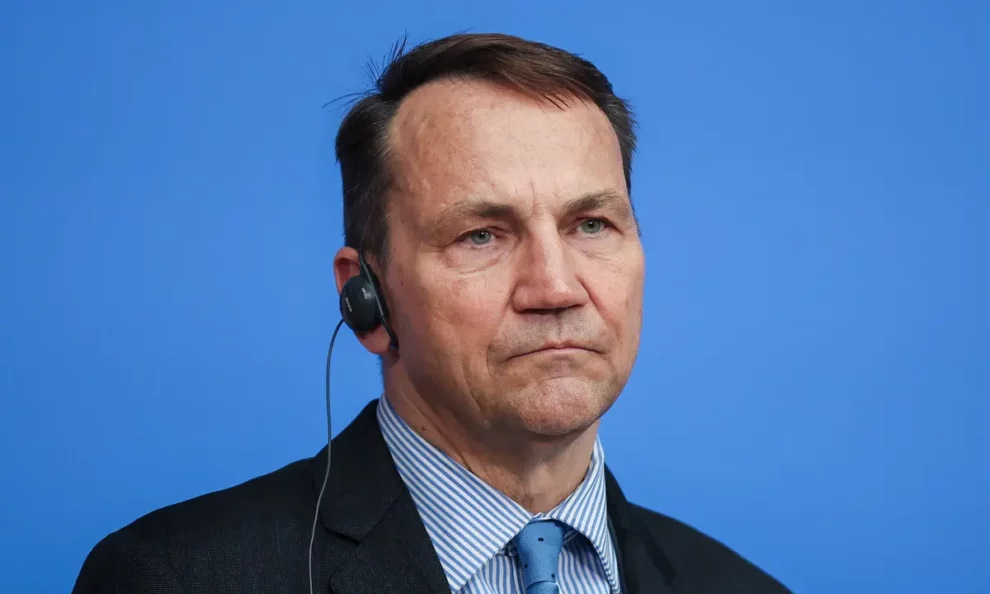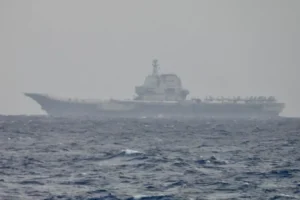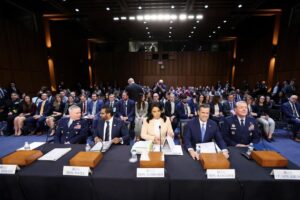A long-term rearmament of Europe, in which the UK can play the closest possible role, is necessary to defeat Russian imperial ambitions, Poland’s foreign minister has said.
Radosław Sikorski also called for majority voting for EU sanctions and a 5,000-strong EU mechanised brigade, and said Poland was willing to back an EU-wide scheme to incentivise Ukrainian draft dodgers to return to their homeland.
In an interview with the Guardian, Sikorski said Poland backed the right of Ukraine to strike at military targets inside Russia, arguing that the west had to stop constantly limiting itself in what it does to support Ukraine. The US national security adviser Jake Sullivan has been holding out against Ukraine using US weapons on Russian territory.
Sikorski, educated at the University of Oxford alongside David Cameron, was in London for a bilateral meeting with the foreign secretary. Sikorski has been a critical figure in taking Poland back to the mainstream of European foreign policy since elections last October led to a new coalition government and an end to eight years of rule by the rightwing nationalist Law and Justice party.

He had just come from a meeting in Berlin with the foreign ministers of France and Germany in the so-called Weimar triangle format, a grouping now seen as the new political powerhouse of the EU.
Although he said Russia was winning mainly small pyrrhic victories, the Weimar group backed a broadly drawn attempt to fill big gaps in EU defence capabilities formed at the end of the cold war.
Poland is spending 4% of its GDP on defence and Sikorski said other countries had catching up to do. He said this required a military reorientation, adding that during the period of the “peace dividend and expeditionary warfare, we focused on high-value, hi-tech platforms and weapons. We are only now rediscovering that actually you just need millions of shells. You need large volumes of low-tech stuff as well.”
He said: “We have allowed all those production facilities to be closed down after the end of the cold war. It costs money to persuade companies to keep production lines in reserve. We just didn’t pay the money. That was part of the peace dividend. And with hindsight it looks like a mistake. It is obvious that Europe is lagging behind, and the EU’s defence and technological and industrial base suffers from years of underinvestment.”
He admitted European defence manufacturers still did not feel that the process of rearmament was permanent, and said Vladimir Putin was spending 40% of Russia’s annual budget on defence and would eventually bankrupt his country by making the military so resource hungry. Russia has 3.5 million people in the military industrial complex. By contrast, “Europe didn’t just disarm, it deindustrialised in the defence field,” Sikorski said.

He said: “Companies were telling me, ‘We read in the newspapers that there is all this demand for armaments but we are not getting the long-term contracts. And if we don’t have a 10-year contract, we are responsible to our shareholders. We can’t make the investments.’ So it’s about guaranteeing them that this is not just for tomorrow, but this is a long-term rearmament and change in security.”
On setting sanctions, he said the Weimar meeting had agreed to advocate for the EU to take on a fuller coordination role. “We should drop the principle of unanimity in sanctions. Some of them have been delayed by one member state blocking them. And also it should be an EU crime to breach EU sanctions and therefore prosecutable by the European prosecution service.”
Sikorski, a long-term student of Russian methods, warned that Putin was trying to woo the right in Europe and the US by weaponising traditionalism. “He is an absurd leader of the international conservatism. We are talking about a KGB colonel, for Christ’s sake. I think the Russians about 15 years ago did some polling, or maybe they just noticed that on some issues like attitudes to homosexuality, gender, to all kinds of identities, you can drive wedges in our societies. On that, for example, central Europe was 10, 15 years behind western Europe in attitudes.”
Although he said the Weimar triangle would have expanded to a quartet but for Brexit, Sikorski said Poland favoured “the deepest possible inclusion of the United Kingdom in the EU security and defence structures, if you so wish”.
He said: “You are an island, but you are a European island. You may have affairs elsewhere, but to us you are married. The EU-UK security defence cooperation must be revitalised and underpinned by a more methodical framework.
“I could imagine Britain being a permanent guest at the foreign affairs council. I mean, I can imagine it. Yes. Whether Britain would want to is another matter.”
On the idea of a full foreign and defence treaty, he said: “Your government has to decide what you want. I think the initiative has to come from you, and you can count on Poland being very receptive to those ideas.” Areas of cooperation he later listed included structured dialogue on the Euro-Atlantic dimension of military capability development, on rapid reaction forces, on resilience, on hybrid cyber and disinformation countermeasures, as well as European defence industry cooperation.
On the issue of Ukrainians avoiding conscription, Sikorski said: “Ukraine has to tell us what she wants us to do about their citizens. What I certainly don’t believe is that there is a human right to be paid social security for being a draft dodger. Those people fighting at the front also have human rights.”
He said any scheme to restrict benefits had to be on a European-wide basis or else those avoiding the draft would start benefit shopping across Europe.
He said Europe had to learn to play the escalation game better by keeping Putin guessing about its intentions. Asked whether it was permissible for Ukraine to strike military targets inside Russia, he said: “The Russians are hitting the Ukrainian’s electricity grid and their grain terminals and gas storage capacity, civilian infrastructure. The Russian operation is conducted from the HQ at Rostov-on-Don. Apart from not using nuclear weapons, Russia does not limit itself much.”
More broadly, he argued: “Always declaring what our own red line is only invites Moscow to tailor its hostile actions to our constantly changing self-imposed limitations.”
He was sceptical about Russian threats to use nuclear weapons, saying: “The Americans have told the Russians that if you explode a nuke, even if it doesn’t kill anybody, we will hit all your targets [positions] in Ukraine with conventional weapons, we’ll destroy all of them.
“I think that’s a credible threat. Also, the Chinese and the Indians have read Russia the riot act. And it’s no child’s play because if that taboo were also to be breached, like the taboo of not changing borders by force, China knows that Japan and Korea would go nuclear, and presumably they don’t want that.”
Source: The Guardian









